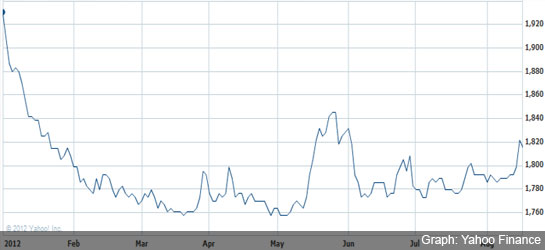
The Colombian peso has been retreating against the dollar, easing pressure on the central bank to buy up U.S. currency, although an interest rate decision later this week and robust foreign investment outlook mean that the country’s currency concerns are far from over.
The Colombian peso has weakened for three straight days against the U.S. currency, closing Wednesday at COP1,897.15 to the dollar. The peso has recently caved under a dry spell in the spot market, where traders are seeing a shortage of U.S. currency.
Local banks, meanwhile, are trying to gobble up dollars to cover a shortage of U.S. currency they need to keep in their balance sheets. Under Colombian regulations, banks need to keep dollar positions to cover their exposure in the forward market, which allows investors to lock in a price to buy or sell a currency at a future date.
“The banks’ dollar position is low and that’s the main reason for the peso’s recent depreciation,” said Munir Jalil, the chief economist in Colombia’s Citigroup unit. The peso’s retreat is following the same pattern that was seen in the last days of December, when banks were forced to buy dollars to cover their forward positions, substantially weakening the peso.
The recent retreat has placed the exchange rate within a range that allows Colombian authorities to feel comfortable, Jalil said. The peso’s recent weakness could give more breathing room to the administration of President Juan Manuel Santos, who has warned that keeping the currency from appreciating is one of his most important challenges.
Santos has faced pressure from exporters and large business federations when the peso has strengthened below the COP1,800 to the dollar level. His government, however, has steered away from demands to impose capital controls and instead has used a recipe that has included daily dollar purchases by the central bank and keeping abroad dollar payments from state-run oil Ecopetrol SA.
The central bank is unlikely to renew its plan to buy at least $20 million daily to drain dollars from the spot market, Jalil said. “At the current exchange rate levels the central bank doesn’t have to keep buying dollars,” he added. The central bank is scheduled to hold a monetary policy meeting on Friday, the last time it meets before the dollar-buying program runs out on March 15.
If the central bank decides to stay out of the spot market, the peso could again start to strengthen, says Bancolombia, the country’s largest bank. The peso could also gain ground against the dollar if the central bank decides to hike its benchmark interest rate, which has been at a historic low of 3% for the 10 consecutive months.
The central bank could start on Friday a cycle of rate hikes, a move that would increase inflows into Colombian assets, to tame a recent uptick in inflation, says Interbolsa SA, the country’s largest brokerage.
Adding to the pressure, foreign direct investment is likely to continue strengthening the peso, said Jalil.
“The fundamentals haven’t changed and we still expect an appreciation of the peso for this year,” he said.
(Darcy Crowe / Dow Jones Newswires)

